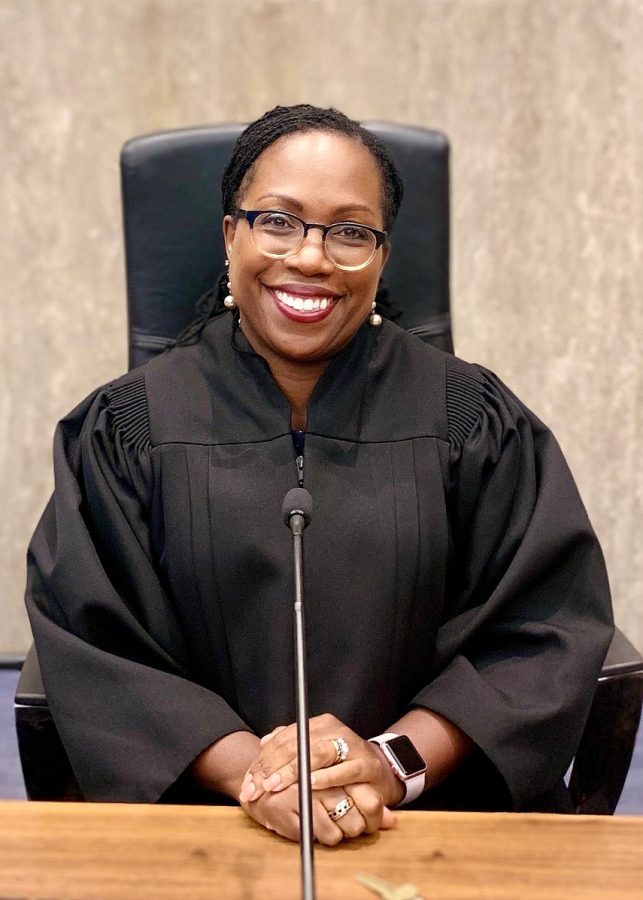Ketanji Brown Jackson: her road to confirmation
Credit: Wikimedia Commons
On Thursday, Apr 7, 2022, in a historic decision, Judge Ketanji Brown Jackson became the first black woman and first public defender to be confirmed to the United States Supreme Court.
April 18, 2022
On Feb. 25, 2022, President Biden nominated Ketanji Brown Jackson to the United States Supreme Court. She will replace Justice Stephen Breyer, who announced his retirement on Jan. 27, 2022.
Jackson was born in Washington D.C. and raised in Miami, Florida, beginning her legal career at Harvard College where she graduated magna cum laude with a degree in government. Following her undergraduate degree, Jackson attended Harvard Law School where she was the editor of the Law Review and graduated with distinction.
Her accomplishments are diverse and impressive. Following law school, from 1999-2000, Jackson would go on to clerk for the very Supreme Court Justice she is now replacing.
“Justice Breyer, in particular, not only gave me the greatest job that any young lawyer could ever hope to have, but he also exemplifies what it means to be a Supreme Court Justice of the highest level of skill and integrity, civility and grace,” Jackson said in an opening statement before her confirmation hearings began.
Other significant milestones in Jackson’s career include her time as a public defender: she will be the first public defender to go on to serve on the Supreme Court. Additionally, in 2009 President Barack Obama nominated Jackson to the United States Sentencing Commission, an independent government agency in charge of sentencing policy and criminal policy, which she served on for four years.
In 2013, President Obama nominated her to be a district court judge for the District of Columbia. Most recently, President Biden nominated her to the United States Court of Appeals for the District of Columbia Circuit, which she has served on since 2021. In all three of these instances, Jackson was confirmed by the Senate with bipartisan support.
About Jackson, Biden said, “I’m pleased to nominate Judge Jackson, who will bring extraordinary qualifications, deep experience and intellect, and a rigorous judicial record to the Court.”
The next step in Jackson’s confirmation process was her confirmation hearings, which occurred almost a month after her nomination on March 21 and lasted for four days. During the confirmation hearings, the Senate Judiciary Committee questioned Jackson on various matters including, but not limited to, her career experience, judicial philosophy, and previous sentencing rulings.
Throughout the hearings, the questions presented to the nominee remained distinctly partisan. According to Insider reporters Oma Seddiq and Sonam Sheth, Republicans were largely accusatory and aggressive, even interrupting Jackson at times, while Democrats “praised Jackson’s character and elevated her diverse experience.”
Significantly, Republican senators were critical of Jackson’s sentencing on the number of child pornography cases she oversaw, accusing her of being “soft on crime”. Additionally, Jackson was grilled about her stand on cultural topics such as critical race theory and affirmative action.
Many fact-checkers and legal experts have disproved the GOP’s claims against Jackson’s child pornography rulings saying, “They lack key context and data that demonstrates that Jackson’s sentencing record mirrors that of most federal judges and that the federal guidelines are outdated and overly severe,” wrote Seddiq and Sheth.
As for the Democratic senators on the Judiciary Committee, their praise relied largely on Jackson’s exemplary record and the significance of her nomination, as she will be the first black, female Supreme Court justice.
Senator Cory Booker became emotional and moved Jackson to tears during his statement.
“You’re a person that is so much more than your race and gender. You’re a Christian. You’re a mom. You’re an intellect. You love books. But for me, I’m sorry, it’s hard for me to look at you and not see my mom, not to see my cousins,” Booker said.
Following the tense confirmation hearings on Monday, April 5, the Senate Judiciary Committee held a vote to move Jackson’s confirmation forward. The vote ended in an 11 to 11 deadlock causing Senate majority leader Chuck Schumer to call for a second procedural vote.
The vote needed a simple majority and was successful, with every Democrat voting for her alongside three Republicans: Susan Collins of Maine, Lisa Murkowski of Alaska, and Mitt Romney of Utah.
In the final step, Jackson had to pass two more votes before her official confirmation; the first was a vote to limit debate on her nomination, which was passed on Thursday, April 7 with the same simple majority of 53 to 47. Finally, on the same day, after a final vote with a 53 to 47 majority, Ketanji Brown Jackson was confirmed.
On the Senate floor, Schumer said, “Today is one of the brightest lights. Let us hope it’s a metaphor, an indication of many bright lights to come.”











